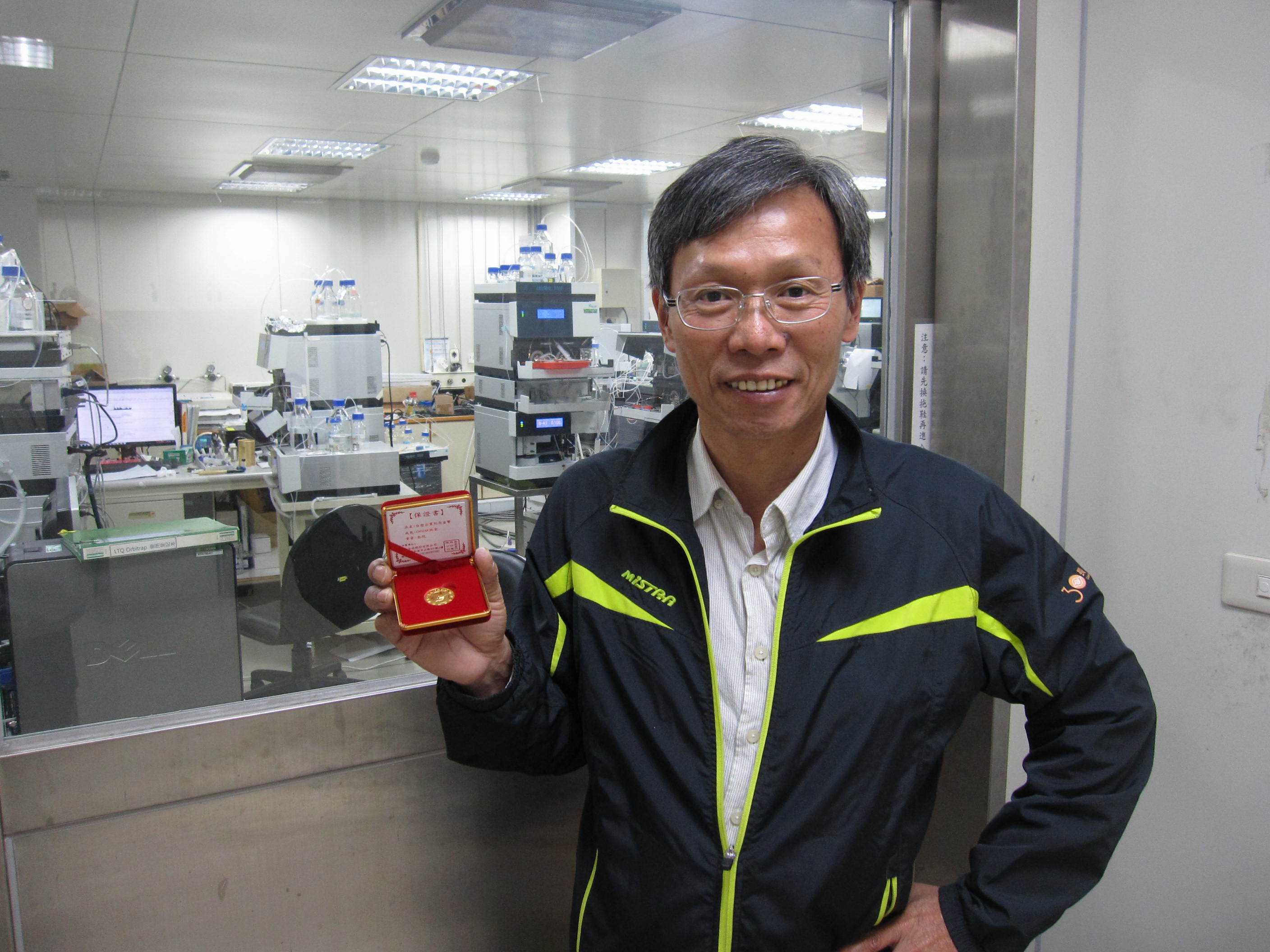簡昆鎰
|
中文姓名: 簡昆鎰 |
||||
|
職稱:副教授 |
研究室名稱:蛋白質體分析實驗室 |
|||
|
最高學歷:Ph.D. |
學校/國家:清華大學/台灣 |
|||
|
分機號碼:5971 |
電子郵件帳號: kychien@mail.cgu.edu.tw |
|||
|
個人網頁網址: |
||||
|
研究室現有: 博士後研究員 0 人 |
博士班研究生 2 人 |
碩士班研究生 0 人 |
||
|
專任研究助理 0 人 |
大學部專題生 0 人 |
|
||
|
研究方向及研究室特色: 蛋白質體學研究是指全面性的探討蛋白質表現程度的學門。在生物醫學領域中,通常著重於找出兩個樣品之間相對差異表現的蛋白。由於分析技術的快速進步,使得蛋白質體分析的覆蓋率,已逐漸趕上基因體學研究。其中最主要的兩項技術為質譜學及胜肽分離技術。本實驗室主要的研究興趣就是針對這兩項技術進行研發及改進,以提升蛋白質體數據的廣泛度、靈敏度、可信度及自動化程度。 |
||||
|
最近五年所發表論文: 1. Tang WF, Huang RT, Chien KY, Huang JY, Lau KS, Jheng JR, Chiu CH, Wu TY, Chen CY, Horng JT. Host MicroRNA miR-197 Plays a Negative Regulatory Role in the Enterovirus 71 Infectious Cycle by Targeting the RAN Protein. J Virol. 2015 Nov 18;90(3):1424-38. 2. Geng J, Sun X, Wang P, Zhang S, Wang X, Wu H, Hong L, Xie C, Li X, Zhao H, Liu Q, Jiang M, Chen Q, Zhang J, Li Y, Song S, Wang HR, Zhou R, Johnson RL, Chien KY, Lin SC, Han J, Avruch J, Chen L, Zhou D. Kinases Mst1 and Mst2 positively regulate phagocytic induction of reactive oxygen species and bactericidal activity. Nat Immunol. 2015 Nov;16(11):1142-52. 3. Huang HW, Liu BS, 4. Chang KP, Lin SJ, Liu SC, Yi JS, Chien KY, Chi LM, Kao HK, Liang Y, Lin YT, Chang YS, Yu JS. Low-molecular-mass secretome profiling identifies HMGA2 and MIF as prognostic biomarkers for oral cavity squamous cell carcinoma. Sci Rep. 2015 Jul 3;5:11689. 5. Gopinath RK, You ST, 6. Chen CD, Wang CL, Yu CJ, Chien KY, Chen YT, Chen MC, Chang YS, Wu CC, Yu JS. Targeted proteomics pipeline reveals potential biomarkers for the diagnosis of metastatic lung cancer in pleural effusion. J Proteome Res. 2014 Jun 6;13(6):2818-29. 7. Lin SJ, Chang KP, Hsu CW, Chi LM, Chien KY, Liang Y, Tsai MH, Lin YT, Yu JS. Low-molecular-mass secretome profiling identifies C-C motif chemokine 5 as a potential plasma biomarker and therapeutic target for nasopharyngeal carcinoma. J Proteomics. 2013 Dec 6;94:186-201. 8. Chang KP, Wang CL, Kao HK, Liang Y, 9. Chen JT, Ho CW, Chi LM, Chien KY, Hsieh YJ, Lin SJ, Yu JS. Identification of the lamin A/C phosphoepitope recognized by the antibody P-STM in mitotic HeLa S3 cells. BMC Biochem. 2013 Jul 19;14:18. 10. Chen CL, Lin TS, Tsai CH, Wu CC, Chung T, Chien KY, Wu M, Chang YS, Yu JS, Chen YT. Identification of potential bladder cancer markers in urine by abundant-protein depletion coupled with quantitative proteomics. J Proteomics. 2013 Jun 24;85:28-43. 11. Dong YM, 12. Chen CL, Lai YF, Tang P, Chien KY, Yu JS, Tsai CH, Chen HW, Wu CC, Chung T, Hsu CW, Chen CD, Chang YS, Chang PL, Chen YT. Comparative and targeted proteomic analyses of urinary microparticles from bladder cancer and hernia patients. J Proteome Res. 2012 Dec 7;11(12):5611-29. 13. Wang CI, Chien KY, Wang CL, Liu HP, Cheng CC, Chang YS, Yu JS, Yu CJ. Quantitative proteomics reveals regulation of karyopherin subunit alpha-2 (KPNA2) and its potential novel cargo proteins in nonsmall cell lung cancer. Mol Cell Proteomics. 2012 Nov;11(11):1105-22. 14. Chen CY, Weng YH, Chien KY, Lin KJ, Yeh TH, Cheng YP, Lu CS, Wang HL. (G2019S) LRRK2 activates MKK4-JNK pathway and causes degeneration of SN dopaminergic neurons in a transgenic mouse model of PD. Cell Death Differ. 2012 Oct;19(10):1623-33. 15. Lin SY, Li TY, Liu Q, Zhang C, Li X, Chen Y, Zhang SM, Lian G, Liu Q, Ruan K, Wang Z, Zhang CS, Chien KY, Wu J, Li Q, Han J, Lin SC. Protein phosphorylation-acetylation cascade connects growth factor deprivation to autophagy. Autophagy. 2012 Sep;8(9):1385-6. 16. Hsieh YJ, Chien KY, Lin SY, Sabu S, Hsu RM, Chi LM, Lyu PC, Yu JS. Photofrin binds to procaspase-3 and mediates photodynamic treatment-triggered methionine oxidation and inactivation of procaspase-3. Cell Death Dis. 2012 Jul 12;3:e347. 17. Sun NK, Huang SL, 18. Lin SY, Li TY, Liu Q, Zhang C, Li X, Chen Y, Zhang SM, Lian G, Liu Q, Ruan K, Wang Z, Zhang CS, Chien KY, Wu J, Li Q, Han J, Lin SC. GSK3-TIP60-ULK1 signaling pathway links growth factor deprivation to autophagy. Science. 2012 Apr 27;336(6080):477-81. 19. Feng Y, 20. Tsai MH, Wu CC, Peng PH, Liang Y, Hsiao YC, Chien KY, Chen JT, Lin SJ, Tang RP, Hsieh LL, Yu JS. Identification of secretory gelsolin as a plasma biomarker associated with distant organ metastasis of colorectal cancer. J Mol Med (Berl). 2012 Feb;90(2):187-200. 21. Wu ZZ, Sun NK, Chien KY, Chao CC. Silencing of the SNARE protein NAPA sensitizes cancer cells to cisplatin by inducing ERK1/2 signaling, synoviolin ubiquitination and p53 accumulation. Biochem Pharmacol. 2011 Dec 1;82(11):1630-40. 22. Chang KP, Yu JS, Chien KY, Lee CW, Liang Y,
|







